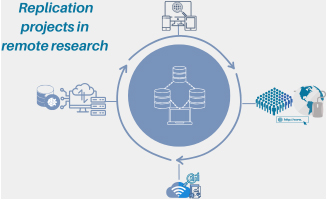
A collection of articles on remote research in cognition and perception using the Internet for the Journal of Perceptual Imaging is presented. Four original articles cover the topics of exact versus conceptual replication of cognitive effects (e.g., mental accounting), effects of facial cues on the perception of avatars, cultural influences on perceptual image and video quality assessment, and how Internet habits influence social cognition and social cognitive research. The essentials of these articles are summarized here, and their contributions are embedded within a wider view and historical perspective on remote research in cognition and perception using the Internet.

In recent years, the need for replication efforts has grown. Replication science faces key challenges, including achieving generalizability across heterogeneous samples and environments while streamlining the theory-experiment cycle to facilitate research efforts. Systematic replication projects using Internet-based methodologies address these challenges by facilitating access to diverse samples, employing rigorous testing, reducing costs, and ensuring materials are readily available. Standards for Internet-based experimenting provides transparency and reproducibility. We present three remote experiments, including one exact replication (N: 410) and two conceptual replications (N: 270; N: 365), which test the mental accounting effect based on Kahneman and Tversky’s classic paradigm. The remote version of the exact replication maintained the same experimental design, instructions, and procedure as the original paradigm. In the two conceptual replications, we adapted the original price to the current value of money: Ticket price and the monetary loss were changed from 10$ to 40€. In the first conceptual replication, we varied the original experimental design: the mental account variable was manipulated within-subjects. In the second conceptual replication, we varied the price stimulus while retaining the mental account manipulation in a between-subjects design. The exact replication replicated the original findings with an effect of small size, while the two conceptual replications replicated the results with an effect of increased size that is more comparable to the original findings. The results highlight the importance of adapting experimental paradigms to the current times, and the advantages of conducting remote replication projects step-by-step.